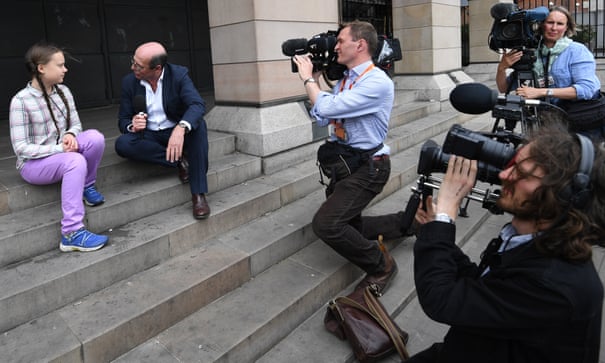from the guardian
Like Greta Thunberg, I am on the autism spectrum. She gives me hope
The attacks on her from neurotypical critics are glib and spiteful. But they are a tribute to the power of her arguments
Rarely have I identified with anything so strongly as when I listened to Greta Thunberg, the 16-year-old Nobel peace prize nominee, talking to Nick Robinson on BBC Radio 4’s Today programme. Like her, I have been diagnosed as being on the autism spectrum, and it is rare that women like me appear in the media.
Yet Thunberg’s rise to prominence has been accompanied by a kind of thoughtlessness and intolerance that you might have expected society to have moved beyond. Some reactions expose how much ignorance and malice remains towards autistic and neurodivergent people, especially among those who don’t share their political views. Spiked’s editor, Brendan O’Neill, seized upon autistic traits Thunberg exhibits, such as her “monotone voice” and forthright manner, to liken her to a “cult member”, in an attempt to delegitimise her message.
In an even more spiteful example, a glib tweet by the Australian writer and lawyer Helen Dale called for Andrew Neil to interview Thunberg with such ferocity that it causes her to “have a meltdown on national telly”. This strongly implies that there are those who want not only to humiliate her but to cause her great emotional distress.
This is what it’s like. To be autistic is to live in a world where everything is too loud, too smelly and too bright, populated by people who say one thing and get angry when you fail to realise that they really meant something different. At the same time, your brain is struggling to keep track of and process the stimuli constantly bombarding it. Your brain and body then shut down and go into overdrive at the same time. Adrenaline courses through your veins. You are swallowed in a cloud of panic and cannot help but scream and sometimes lash out at others or even yourself.Autistic meltdowns are frequently misunderstood and brushed off as tantrums, but those who mischaracterise them as such are providing neurotypical rationalisations for behaviour they are unable to empathise with.
But then, almost as soon as the meltdown erupts, it is over, and you are left with a mixture of exhaustion and intense shame. It can take days for the burnout to dissipate, but the shame is far longer lasting. It can colour the way that people see you and treat you.
To get satisfaction from an autistic person’s distress is callous. Like Thunberg, I believe autism can be a gift. It gives me drive and passion and the ability to see through rhetoric and think outside the box, as Thunberg told Robinson. Not every autistic person may feel this way – it’s a broad spectrum. Forty per cent of autistic people have symptoms of an anxiety disorder, such as selective mutism, with which Thunberghas been diagnosed. The same differences that can make autistic people unconventional and innovative thinkers make them vulnerable to bullying, which creates a vicious cycle of anxiety, meltdowns and abuse.
Before I received my diagnosis of autism spectrum disorder, in 2016, it was as if a barrier existed between me and neurotypical people, making us unable to understand each other. Since then, I have been able to develop coping strategies, such as wearing noise-cancelling headphones to reduce the risk of having a meltdown, and I have realised the importance of using my own voice to illuminate the condition. I have also found comfort in learning that there are others, such as Thunberg, who live life on a different wavelength.
If there is any reason to take heart from the blinkered targeting of Thunberg, it is that her opponents are unable to criticise her solely on the grounds of her message. The power of this message exemplifies the value of an unconventional outlook and demonstrates why we need neurodiversity to help create a future worth living in.
• Charlie Hancock is an A-level student from North Yorkshire
